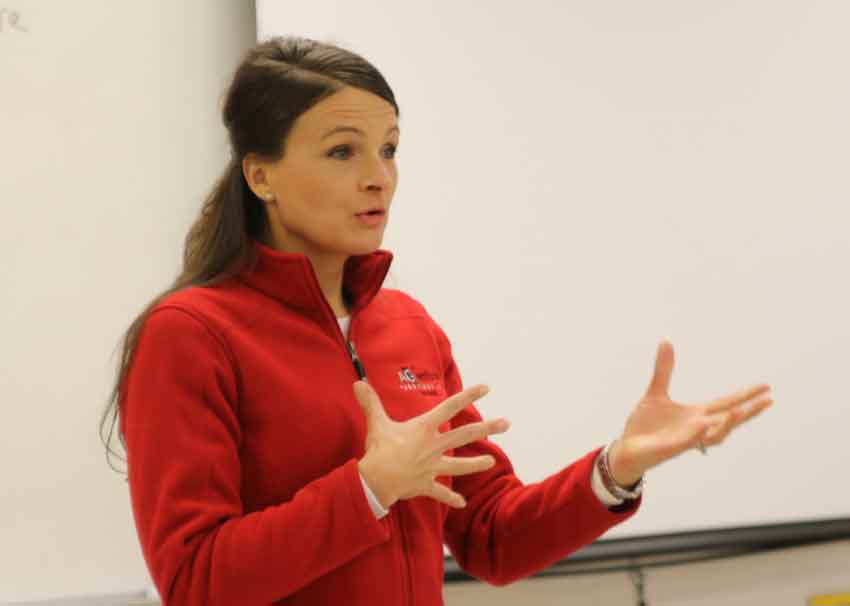Your cart is currently empty!
KAHS students learn about ag careers

Jeff Lerum is the long-term substitute for Tracy Nelson who is on leave dealing with serious illness in the family.
For the last day of eighth-grade ag class, Lerum invited three guest speakers to class, to speak to students about their different roles in agricultural business.
Food science
Jennifer Schiefelbein spoke about her job as a food scientist in quality control for a food manufacturer. She telecommutes, working from the computer at home with the
factory in Illinois. She received both a bachelor?Äôs and master?Äôs degree in food science at Texas A&M University. One of the products the factory makes is cooked, canned beans. Quality control is in charge of making sure the right beans get in the can and that there are no foreign bodies, that the recipe and quality are consistent, and that labeling reflects accurately what is in each can.
There is a great need for food scientists, and the job market far exceeds those graduating with degrees in it.
Jennifer Schiefelbein has a M.S. in Food Science. There are a number of careers open to graduates with food science degrees. She works at a canning plant in Illinois, from her home computer.
Feed company
Sandy Hansen-Wolff had only been married a year when her husband died of cancer. AgVenture Feed & Seed was his company; she worked elsewhere. So she didn?Äôt choose agribusiness, but she did choose to stay in it.
She was working against the odds, and it took a lot of drive and determination to learn the business and then bring it from the brink of bankruptcy. None of the  knowledge of the business was written down; it was all in her husband?Äôs head, and he was no longer there to help. She had to change her mindset from ?Äúwhat do I do when the business fails??Äù to ?Äúhow am I going to make this work??Äù
knowledge of the business was written down; it was all in her husband?Äôs head, and he was no longer there to help. She had to change her mindset from ?Äúwhat do I do when the business fails??Äù to ?Äúhow am I going to make this work??Äù
For the first year, she tried to fit in in a business so dominated by men. She learned that trying to be someone she?Äôs not was not the solution.
Her advice to students: Pick something you love, and the money tends to follow. And, as an employee: work hard.
She had a few other words of advice for people (not just women) in business: take on a learning mentality, see the opportunity in everything, and fail fast (get it over with, make a shift, and move on).
Sandy Hansen-Wolff didn?Äôt choose the feed business, it was her husband?Äôs business. But she chose to stay in the business after his death from cancer. She says ag business is growing, fun, and dynamic.
Dairy, crop farm
Brothers Tom and Dan came with their father Rich Janski. Together they operate Janski Farms. They grow a variety of cash crops including, last year, peas for Seneca Foods. They also milk about 210 cows.
The average age of a farmer today is 58. So there?Äôs a great need for young people to step into the industry.
As the brothers stepped into the family farm, it was decided to make a major upgrade: four robotic stations were built and the entire milking operation was revamped. They?Äôve used the robotic system since January 2014. (Interestingly, their cows come in for milking at will, when and how they want to. They average more than three milkings a day this way, and the cows seem to be very happy.)
The general consensus of all three speakers was that there is definitely a place for young people in the growing field of agriculture, and that there are many different roles to fill in the industry.
Tom Janski wanted to be a farmer since he was in high school. He and his brother Dan and father Rich farm 4,000 Acres of cash crops and milk about 210 cows.
Staff photos by Jean Doran Matua.
